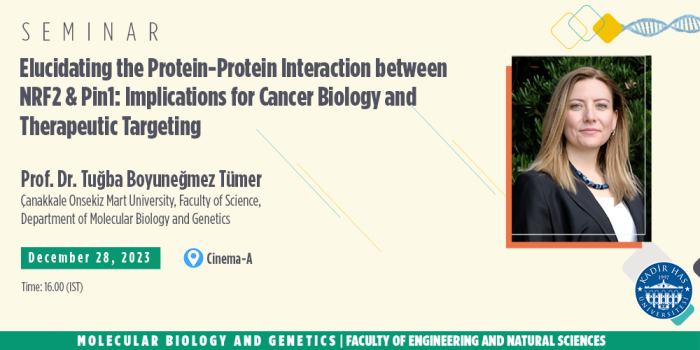
Moleküler Biyoloji ve Genetik Seminerleri: Prof. Dr. Tuğba Boyuneğmez Tümer

Moleküler Biyoloji ve Genetik Bölümümüzün organize ettiği seminer serisinin yeni konuğu, Prof. Dr. Tuğba Boyuneğmez Tümer (Çanakkale Onsekiz Mart Üniversitesi Fen Fakültesi Moleküler Biyoloji ve Genetik Bölümü) olacak.
Prof. Boyuneğmez Tümer’in “Elucidating the Protein-Protein Interaction between NRF2 & Pin1: Implications for Cancer Biology and Therapeutic Targeting” başlıklı konuşmasını 28 Aralık Perşembe 16.00-17.00 arasında Sinema-A salonunda takip edebilirsiniz.
Özet: Cellular signaling pathways are intricately regulated by protein-protein interactions (PPI), playing a pivotal role in various biological processes, including cancer development. Our study aims to shed light on the complex interplay between NRF2 and Pin1 proteins, as well as the latent binding competition involving Pin1/NRF2/KEAP1. NRF2’s aberrant activation has been implicated in multiple cancer types, driving cell proliferation, suppressing apoptosis, enhancing cancer stem cell self-renewal, and promoting chemoresistance and radioresistance. Likewise, Pin1, a cis-trans isomerase, has been implicated in cancer pathogenesis through its modulation of critical cellular pathways.
Although previous studies hinted at a functional interaction between Pin1 and NRF2, the direct physical nature of these interactions remained elusive. Recently, it was demonstrated that Pin1 indeed interacts with NRF2 and KEAP1 via its WW and PPIase domains, with a specific preference for phosphorylated residues on NRF2. The study revealed the essential role of NRF2 phosphorylation at S215, S408, and S577 for the Pin1-NRF2 interaction. To gain comprehensive insights, our research employs an integrated computational and biophysical approach. We aim to identify potential interaction between 14-mer long peptides, mimicking distinct NRF2 regions (S215, S408, and S577), and Pin1 through molecular docking and dynamics simulations, determining their binding modes. Additionally, qualitative data on the strength of these interactions were also identified. Furthermore, we explored the impact of Pin1 inhibitors on this specific PPI, utilizing a combination of biophysical methods.
The findings of current study help the understanding of the mechanistic basis of the Pin1-NRF2 interaction, revealing potential avenues for therapeutic targeting of NRF2-driven cancer pathways. We anticipate that our integrated approach will contribute valuable insights to the field of PPIs and offer promising opportunities for the development of novel cancer treatments.
Konuşmacı Hakkında: Tugba Boyunegmez Tumer is currently Full Professor of Biochemistry at the Department of Molecular Biology and Genetics, at the Çanakkale Onsekiz Mart University, Turkiye. She earned her MSc and PhD degrees from the Middle East Technical University, Turkiye in 2004 and 2009, respectively. In 2013 and 2014, she worked as a post-doc researcher in NIH Funded International Research Training Center for Botanicals and Metabolic Syndrome, at Rutgers University, New Jersey, USA. Upon her return to Turkiye, she was recruited to Çanakkale Onsekiz Mart University, where she has established a research team focusing on understanding the molecular effects of natural product-derived and synthetic small molecules on chronic inflammatory conditions and is working towards development of pharmacological lead compounds for prevention and treatment of chronic diseases particularly, cancer and neuroinflammation. Her lab combines in vitro/in vivo assays, multi-omic tools and in silico computation, modelling and ADMET approaches for rational lead discoveries.
